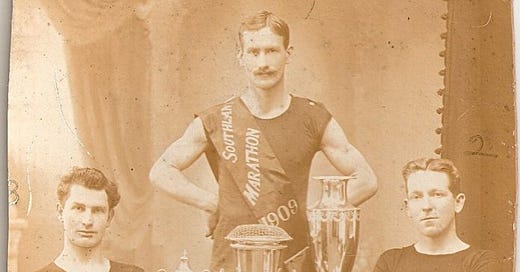It should not surprise that one of the off-shoots of the staging of the Marathon at the 1908 Olympic Games, the event that created the official measurement of the event at 26 miles 385 yards, was the craze for attempting to emulate the feats of Dorando Pietri et al.
The south coast of New Zealand was about as far as it was possible to be on planet Earth, but that was where the first Marathon run over the official distance was staged in Australasia, on July 14, 1909.

David Stewart (rear) with the winner’s sash and trophy while second-placed E.A. Allan is at right and third-placed J. Alsweiler.
Enthusiasts from the Union Harrier Club were responsible for staging the event which was raced over a course from Riverton to Invercargill and which finished at Rugby Park in the southern city. The basis of the course remains for the annual race usually held late in the southern spring.
In spite of local critics who scoffed that the inaugural event would become a fiasco as every many and his dog lined-up only for two or three to finish, there were 14 starters, who had gone through, for what was described, at the time, as a rigorous medical check when their entries were received.
Given that not a lot of excitement tended to happen amid a southern winter, apart from a big rugby game or two, the public interest was roused with a big crowd watching the start of the race, and crowds out watching along the race route.
Motorcars were relatively new, but those who could afford them took to the road to follow the runners.
A big crowd gathered at Rugby Park at the finish line, and no surprises the first runner through was sporting a red cap and playing to the crowd with more vigour than might be expected to be available to most at the end of such a long run. He was wearing an advertisement on his back for a draper's sale, so the enthusiasm of spectators returned to the first sight of the leading runner.
The first man across the line was from the host club, one David Stewart, and he breasted the finishing tape, one end of which was in the hand of the Mayor of Invercargill, Mr C.S. Longuet.
Stewart's time through some sticky road surfaces in chilly conditions was 3:22.30, a time that could have been reduced had he been pushed at any stage of the race.
A former rugby player in the front row of the local Britannia Football Club's side in Invercargill rugby, he had a stint in Horowhenua North during which time he achieved a place in the Manawhenua representative team of 1908, the same year as his return to Invercargill.
Stewart sat back in the field initially letting a group of five others enjoy a lead of about 350 yards. Stewart made his move at Wright's Bush, close to halfway through the race, and the pace he maintained soon saw all but two of the others dropping back, and several of them, out of the race.
Three who led the race through Wallacetown were reduced to two by Makarewa's bridge. Stewart and a runner by the name of E.A. Allan were fortified by 'brandy flips' at Underwood just before reaching the Wallacetown Junction, close to the 20-mile mark 2:28 hours along the course.
The Southland Times recorded: "Here it was that all the doubts as to the issue of the race were settled. The hard pull through the mud in the Underwood flat had told heavily on Allan, who was obviously distressed, while Stewart's short, quick stride was as springy as ever.
"The race was practically over here. Stewart, hearing of Frew's break-up [another of the leading group who had been running alone in third place] and seeing Allan's distress, started to nurse his club-mate occasionally jogging in front to make [the] pace, and again resting behind to add encouragement."
Eventually, as they reached Waikiwi, Stewart began to move ahead by about 400 yards in the run down Elles Road with Rugby Park not too far distant. He lifted his speed once through the gates to claim the win with Allan finishing two minutes back.
Of the 14 who started, seven of them completed the race, four of them in under four hours, all but one were members of the Union Harriers.
NOTE: The race record is held by John Campbell who ran 2:12.38 in 1985. He beat the record of 2:16.47 set by future Commonwealth Games gold medalist Dick Tayler in 1972.


